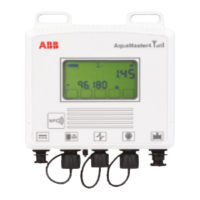4 Transport and storage
Inspection
Check the sensors immediately after unpacking for possible
damage that may have occurred from improper transport.
Details of any damage that has occurred in transit must be
recorded on the transport documents. All claims for damages
must be submitted to the shipper without delay and before
installation.
Transport
WARNING – BODILY INJURY
Life-threatening danger due to suspended loads. In
the case of suspended loads, a danger of the load
falling exists.
Remaining under suspended loads is prohibited.
WARNING – RISK OF INJURY DUE TO SENSOR
SLIPPING.
The sensor’s center of gravity may be higher than the
harness suspension points.
• Make sure that the sensor does not slip or turn
during transport.
• Support the sensor laterally during transport.
Flanged sensors ≤ DN 450
• Carrying straps must be used to transport flanged designs
smaller than DN 450.
• Wrap the straps around both process connections when
lifting the sensor.
• Do not use chains as they may damage the housing.
Figure 9 Transport instructions ≤ DN 450
Flanged sensors ≥ DN 450
• Flanged sensors must not be lifted by the center of the
housing when using a forklift for transport.
• Flanged sensors must not be lifted by the terminal box or by
the center of the housing.
• Only the transport lugs fitted to the sensor can be used to lift
the sensor and insert it into the piping.
Figure 10 Transport instructions ≥ DN 450
Storing the sensor
Note the following when storing sensors:
• Store the sensor in its original packaging in a dry and dust-
free location.
• Observe the permitted ambient conditions for transport
and storage.
• Do not store the sensor in direct sunlight.
Storage temperature
–20 to 70 °C (–4 to 158 °F)
The ambient conditions for the transport and storage of the
sensor must correspond to the ambient conditions for
operation of the sensor.
Adhere to the AquaMaster4 data sheet (DS/FET400-EN)!

